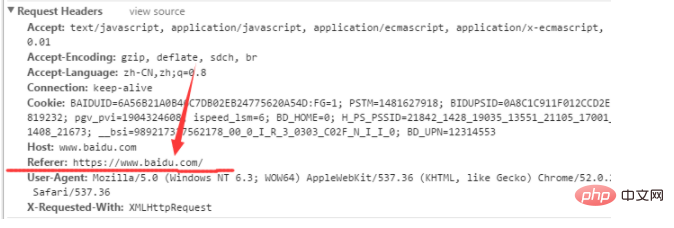Share solutions to several common web security risks

The following are several common web security problems and solutions. I hope they can be helpful to everyone.
1. Cross Site Scripting
Solution
xss occurs because the data entered by the user becomes code, so it needs Perform HTML escape processing on the data input by the user, and escape and encode special characters such as "angle brackets", "single quotes", and "double quotes".
2. SQL injection
When reporting an error, try to use the error page to overwrite the stack information

3. Cross-site request forgery (Cross- Site Request Forgery)
Solution
(1) Set the cookie to HttpOnly
server.xml is configured as follows
<Context docBase="项目" path="/netcredit" reloadable="false" useHttpOnly="true"/>
web.xml is configured as follows

(2) Add token
Add a hidden field to the form, submit the hidden field when submitting, and the server verifies the token.
(3) Identification through referer
According to the HTTP protocol, there is a field in the HTTP header submitted to the Referer, which records the source address of the HTTP request. If an attacker wants to implement a CSRF attack, he must forge requests from other sites. When a user sends a request through another website, the value of the Referer requested is the URL of the other website. Therefore, the Referer value can be verified for each request.

4. File upload vulnerability
We often operate on the Internet to upload pictures and files to the server for storage. At this time, if the picture files are not processed Correct verification will cause some malicious attackers to upload viruses, Trojans, plug-ins, etc. to the server, steal server information, and even cause the server to crash.
Therefore, the uploaded files need to be verified. The first few bytes of many files are fixed. Therefore, based on the contents of these few bytes, the type of the file can be determined. These few Bytes are also called magic numbers.
Set type whitelist
Related recommendations: web server security
The above is the detailed content of Share solutions to several common web security risks. For more information, please follow other related articles on the PHP Chinese website!

Hot AI Tools

Undresser.AI Undress
AI-powered app for creating realistic nude photos

AI Clothes Remover
Online AI tool for removing clothes from photos.

Undress AI Tool
Undress images for free

Clothoff.io
AI clothes remover

AI Hentai Generator
Generate AI Hentai for free.

Hot Article

Hot Tools

Notepad++7.3.1
Easy-to-use and free code editor

SublimeText3 Chinese version
Chinese version, very easy to use

Zend Studio 13.0.1
Powerful PHP integrated development environment

Dreamweaver CS6
Visual web development tools

SublimeText3 Mac version
God-level code editing software (SublimeText3)

Hot Topics
 1385
1385
 52
52
 What to do if the Bootstrap Table uses AJAX to get data garbled
Apr 07, 2025 am 11:54 AM
What to do if the Bootstrap Table uses AJAX to get data garbled
Apr 07, 2025 am 11:54 AM
Solutions to the garbled code of Bootstrap Table when using AJAX to obtain data from the server: 1. Set the correct character encoding of the server-side code (such as UTF-8). 2. Set the request header in the AJAX request and specify the accepted character encoding (Accept-Charset). 3. Use the "unescape" converter of the Bootstrap Table to decode the escaped HTML entity into original characters.
 How to remove the default style in Bootstrap list?
Apr 07, 2025 am 10:18 AM
How to remove the default style in Bootstrap list?
Apr 07, 2025 am 10:18 AM
The default style of the Bootstrap list can be removed with CSS override. Use more specific CSS rules and selectors, follow the "proximity principle" and "weight principle", overriding the Bootstrap default style. To avoid style conflicts, more targeted selectors can be used. If the override is unsuccessful, adjust the weight of the custom CSS. At the same time, pay attention to performance optimization, avoid overuse of !important, and write concise and efficient CSS code.
 Navicat's solution to the database cannot be connected
Apr 08, 2025 pm 11:12 PM
Navicat's solution to the database cannot be connected
Apr 08, 2025 pm 11:12 PM
The following steps can be used to resolve the problem that Navicat cannot connect to the database: Check the server connection, make sure the server is running, address and port correctly, and the firewall allows connections. Verify the login information and confirm that the user name, password and permissions are correct. Check network connections and troubleshoot network problems such as router or firewall failures. Disable SSL connections, which may not be supported by some servers. Check the database version to make sure the Navicat version is compatible with the target database. Adjust the connection timeout, and for remote or slower connections, increase the connection timeout timeout. Other workarounds, if the above steps are not working, you can try restarting the software, using a different connection driver, or consulting the database administrator or official Navicat support.
 Solutions to the errors reported by MySQL on a specific system version
Apr 08, 2025 am 11:54 AM
Solutions to the errors reported by MySQL on a specific system version
Apr 08, 2025 am 11:54 AM
The solution to MySQL installation error is: 1. Carefully check the system environment to ensure that the MySQL dependency library requirements are met. Different operating systems and version requirements are different; 2. Carefully read the error message and take corresponding measures according to prompts (such as missing library files or insufficient permissions), such as installing dependencies or using sudo commands; 3. If necessary, try to install the source code and carefully check the compilation log, but this requires a certain amount of Linux knowledge and experience. The key to ultimately solving the problem is to carefully check the system environment and error information, and refer to the official documents.
 How to solve mysql cannot connect to local host
Apr 08, 2025 pm 02:24 PM
How to solve mysql cannot connect to local host
Apr 08, 2025 pm 02:24 PM
The MySQL connection may be due to the following reasons: MySQL service is not started, the firewall intercepts the connection, the port number is incorrect, the user name or password is incorrect, the listening address in my.cnf is improperly configured, etc. The troubleshooting steps include: 1. Check whether the MySQL service is running; 2. Adjust the firewall settings to allow MySQL to listen to port 3306; 3. Confirm that the port number is consistent with the actual port number; 4. Check whether the user name and password are correct; 5. Make sure the bind-address settings in my.cnf are correct.
 Unable to log in to mysql as root
Apr 08, 2025 pm 04:54 PM
Unable to log in to mysql as root
Apr 08, 2025 pm 04:54 PM
The main reasons why you cannot log in to MySQL as root are permission problems, configuration file errors, password inconsistent, socket file problems, or firewall interception. The solution includes: check whether the bind-address parameter in the configuration file is configured correctly. Check whether the root user permissions have been modified or deleted and reset. Verify that the password is accurate, including case and special characters. Check socket file permission settings and paths. Check that the firewall blocks connections to the MySQL server.
 How to use export default in Vue
Apr 07, 2025 pm 07:21 PM
How to use export default in Vue
Apr 07, 2025 pm 07:21 PM
Export default in Vue reveals: Default export, import the entire module at one time, without specifying a name. Components are converted into modules at compile time, and available modules are packaged through the build tool. It can be combined with named exports and export other content, such as constants or functions. Frequently asked questions include circular dependencies, path errors, and build errors, requiring careful examination of the code and import statements. Best practices include code segmentation, readability, and component reuse.
 How to solve the problem of garbled code in PHP and Bootstrap Table
Apr 07, 2025 am 11:27 AM
How to solve the problem of garbled code in PHP and Bootstrap Table
Apr 07, 2025 am 11:27 AM
Solutions to display Chinese garbled code with Bootstrap Table: 1. Set the PHP character set to UTF-8; 2. Set the character set in the PHP script; 3. Make sure the database character set is UTF-8; 4. Set the character set of the Bootstrap Table to "zh-CN"; 5. Use mbstring to extend cast character set; 6. Transcode data from other encodings; 7. Check browser encoding.




